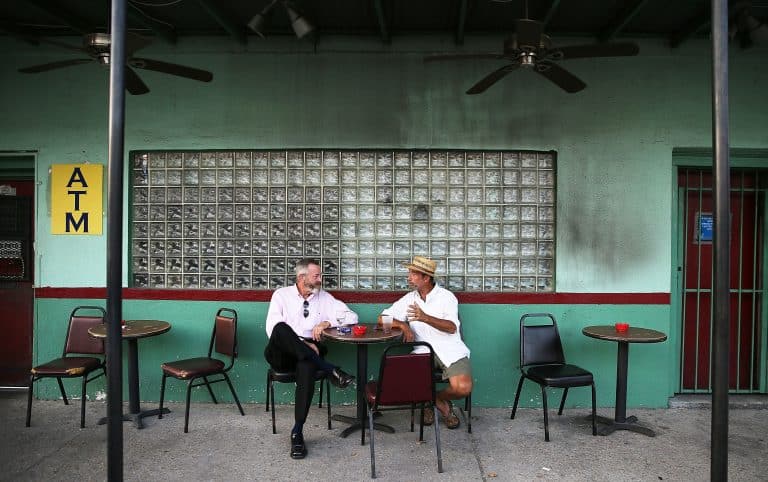
Image by Trey Ratcliff/Flickr (CC BY-NC-ND 2.0)..
Listening in the Cracks
I get to a small town in Indiana just 15 minutes before the restaurant within the Holiday Inn is closing for the night. I don’t feel particularly hungry, even though it is nearly midnight. I am still riding the adrenaline of the 100-mile drive through an unknown darkness alongside semi-trucks.
I’d flipped through the preposterous number of Sirius radio channels before settling on silence. I don’t get a lot of silence these days. My darkness is mostly familiar — a baby whimpering in the next room, my husband getting up to go to the bathroom, the homeless folks sorting through the recycling bins outside our bedroom window. It felt good to be hurdling myself through night, alone and on a mission.
My eyes wander over the menu, unsatisfied. “The chicken wings are really top notch,” says the man sitting at the bar. A long, rectangular plate filled with chicken wings and onion rings is piled in front of him. He takes a long sip of his beer. He is black, balding, wearing a cranberry velour jumpsuit, looks to be in his 50s.
“Everything is good here,” the waitress reassures me. She is young, maybe in her late 20s, wearing a lot of foundation that is even paler than her already pale skin. I’m cynical about her claim, but order the burger and hope for the best. I sit at a tall table, away from the bar, hoping to send the message that I am enjoying my rare solitude.
I end up eavesdropping instead. It’s a compulsion.
My previous partner, Nikolai, a born-and-bred New Yorker, tried to teach me how to look into the glass of the subway doors so I could see the reflection of the people I was listening to rather than staring straight at them, but I never got the hang of it. I’m hopeless. I eavesdrop like other people watch reality television, I guess — a little guiltily, but with so much pleasure that I can’t resist.

In any case, the chicken wing aficionado clearly isn’t a guest of the hotel, but a local who frequents the Holiday Inn for late dinners. He and the waitress have the kind of rapport that evolves over many late nights of shooting the shit. They talk about their love lives. He is gay, struggling to find partners in a town where there isn’t a very visible gay community. She is trying to get over a bad man, someone that she knows doesn’t deserve her but she loves all the same. They even talk about sex. He’s scared to have it again after so long. She’d thought it would make him stay; now she realizes that it’s better it didn’t.
It’s such an intimate conversation. There is so much shared struggle between these two people who, on paper, would seem to have nothing to talk about — different generations, different races, different genders, different sexual orientations. Yet, here they are, in this small town plunked in the middle of endless cornfields, perched on opposite sides of a hotel bar, just listening to one another talk.
The Center for Courage and Renewal, the organization that Parker Palmer co-founded, has what they call a “touchstone,” which basically means a guideline or agreement for a group: “No fixing, saving, advising, or correcting each other.”
The first time I read it, it sort of took my breath away. So much of our time is spent listening to other people in a doggedly goal-oriented way. Underneath our listening, we’re asking ourselves: What can I pluck from what this person is saying that I identify with? What confirms my worldview? What gives me an opportunity to offer advice or a response that will showcase my own intelligence or a chance to share an experience about my life?
I don’t mean to make that kind of listening sound shallow or manipulative. Ultimately, it’s with great intention that we listen like that. We crave to connect. We crave to be seen. We crave to comfort. It’s a very useful kind of listening. It helps us create new nodes, get things done, coalesce within communities.
But there is another kind of listening, a listening that we neglect at our own peril, that is not about getting some particular place, but simply about witnessing another human being. This kind of listening is long and open-ended. It’s patient. It’s curious. It’s not calculating. This kind of listening operates on only one level — the words coming out, the way they hit the ear, the shaping of a story, a sadness, a yearning, a wish.
The guy and the woman in that Holiday Inn, close to midnight on a Monday, were listening like that to one another. Witness over chicken wings. And they made me think about all the people all over the country, sitting in hotel bars and lingering outside of churches and snuggled on living room couches and sitting over steaming cups of tea and maybe even crammed onto airplanes who listen without static or plotting. It’s an overlooked kind of love, a way we stay sane. It happens in the cracks, under the radar, just between two people. And it doesn’t happen enough.
The burger was surprisingly good. The lesson in listening, totally unexpected.

